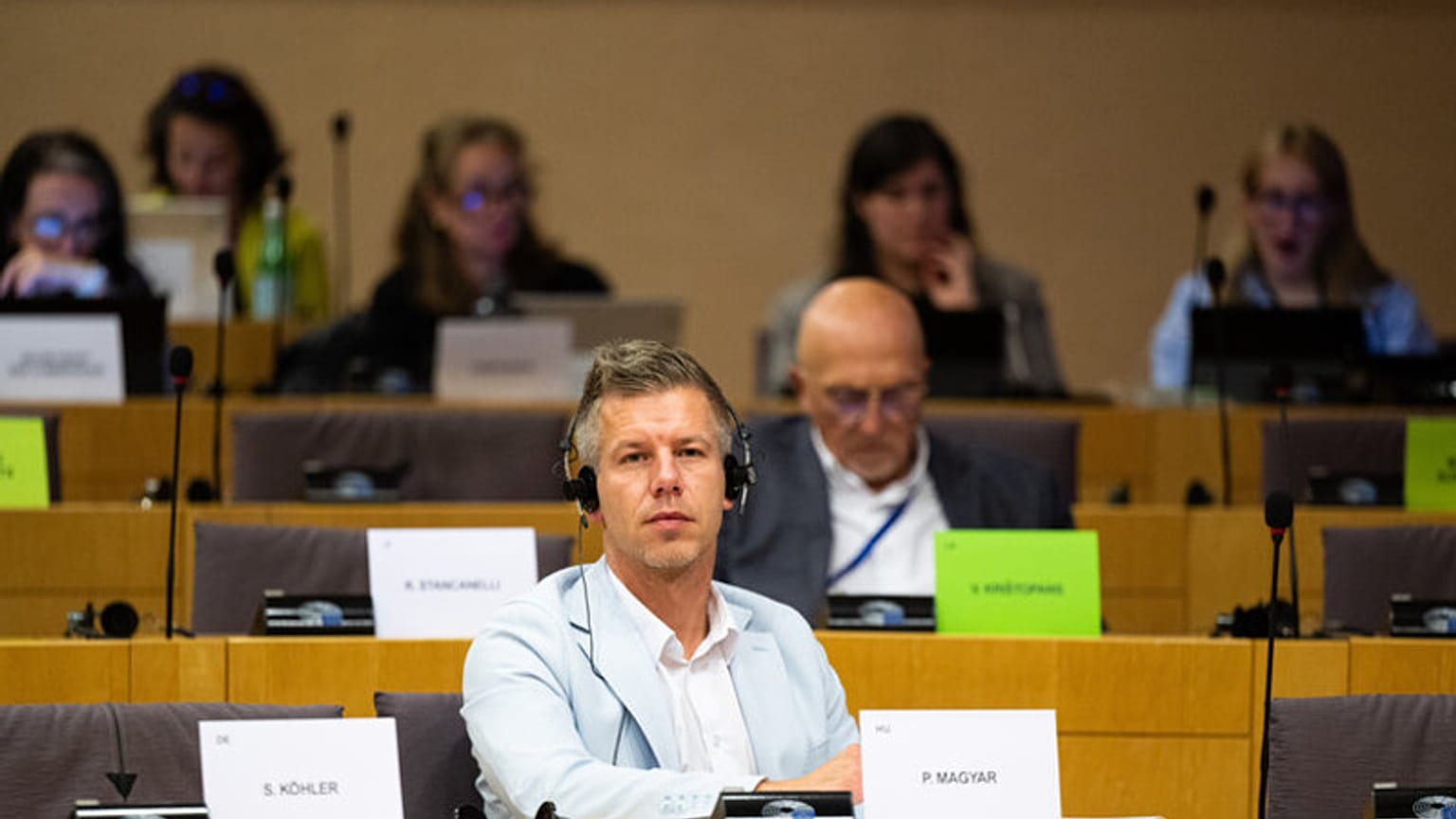Top Stories
European Parliament Votes on Lifting Immunity of Five MEPs

The European Parliament’s Committee on Legal Affairs is poised to vote on whether to lift the immunity of five Members of the European Parliament (MEPs) today, with significant implications for the individuals involved. Among those at the center of this decision are Hungarian opposition leader Peter Magyar and Italian lawmaker Ilaria Salis. The committee’s deliberations will involve seven requests for immunity waivers, three of which have been lodged by Hungary’s judiciary.
The Committee on Legal Affairs (JURI) comprises 25 lawmakers who will cast their votes in secret. Their recommendations will then go to the Parliament for a plenary session, where all MEPs will have an opportunity to confirm or overturn the committee’s decisions. If immunity is lifted, national authorities can initiate legal proceedings against the affected MEPs while they retain their parliamentary seats.
Peter Magyar, the founder and leader of Hungary’s opposition Tisza party, faces three separate requests for immunity to be lifted. The Hungarian authorities are pursuing him for allegations of theft and defamation. The first charge stems from an incident in a Budapest nightclub where he reportedly threw a man’s phone into the Danube River after a disagreement. The second and third requests arise from defamation lawsuits filed by former Hungarian MP György Simonka and the far-right Our Homeland Movement. Magyar characterizes these legal actions as politically motivated, asserting that they are designed to undermine his party, which currently poses a significant challenge to Viktor Orbán‘s ruling Fidesz party.
Magyar stated, “I think it’s obvious to everyone that this is a political issue. I’m a forty-four-year-old lawyer with three children, a clean record, who has had national security clearances for more than half of the last two decades.” Despite the gravity of the accusations, it is anticipated that Magyar may retain his immunity due to his affiliation with the centre-right European People’s Party (EPP), the largest group in the European Parliament, along with support from other political factions.
Ilaria Salis presents a different challenge. She was arrested in February 2023 during an anti-fascist demonstration in Budapest. Salis faces charges related to allegedly assaulting two far-right militants. During her arrest, she claimed to have endured harsh conditions and human rights violations while in pre-trial detention for over 15 months. Her situation garnered significant attention in Italy, leading to diplomatic discussions between the Italian government and Hungary. Following her election to the European Parliament in June 2024 with the Alliance Greens-Left party, Salis regained her freedom through parliamentary immunity. Nevertheless, Hungarian authorities are seeking to lift her immunity to finalize the trial against her.
Salis expressed serious concerns about the fairness of a potential trial in Hungary. “In Budapest I would face a show trial, without the most basic democratic safeguards,” she warned. The political climate surrounding her case is fraught, with Hungarian officials, including Zoltan Kovacs, suggesting punitive measures against her.
Another MEP under scrutiny is Klára Dobrev, also from Hungary. Dobrev is entangled in legal issues due to accusations of public defamation made in March 2024. She alleged that a local official was involved in a paedophilia scandal linked to the downfall of President Katalin Novák and Justice Minister Judit Varga. Dobrev’s case has been characterized by her supporters as politically charged, with calls for the lifting of her immunity dating back a year.
The situation is not limited to Hungarian MEPs. Two members of Poland’s ruling Law and Justice party (PiS), Michał Dworczyk and Daniel Obajtek, also face requests to have their immunity lifted. Dworczyk’s case arises from a cyberattack he experienced in 2021 while serving as head of cabinet to former Prime Minister Mateusz Morawiecki. The Polish Prosecutor General claims Dworczyk failed to meet his obligations as a state official during the incident. Meanwhile, Obajtek is accused of providing false testimony in court and unlawfully restricting the distribution of a left-wing magazine.
Dworczyk has expressed concerns about the motives behind the requests, describing them as political retribution. “The Polish prosecutor’s office wants to strip me of my immunity, just because I opposed offending religious feelings,” he asserted.
As the vote approaches, the dynamics within the European Parliament are expected to influence the outcome significantly. While it is likely that some MEPs will support the lifting of immunity for certain individuals, the larger political ramifications of such decisions remain to be seen. The outcome will not only affect the MEPs involved but could also send a broader message regarding the state of political freedoms in Hungary and Poland. The international community will be watching closely as the vote unfolds.
-

 Top Stories2 months ago
Top Stories2 months agoTributes Surge for 9-Year-Old Leon Briody After Cancer Battle
-

 Entertainment3 months ago
Entertainment3 months agoAimee Osbourne Joins Family for Emotional Tribute to Ozzy
-

 Politics3 months ago
Politics3 months agoDanny Healy-Rae Considers Complaint After Altercation with Garda
-

 Top Stories3 months ago
Top Stories3 months agoIreland Enjoys Summer Heat as Hurricane Erin Approaches Atlantic
-

 World4 months ago
World4 months agoHawaii Commemorates 80 Years Since Hiroshima Bombing with Ceremony
-

 Top Stories2 months ago
Top Stories2 months agoNewcastle West Woman Patricia Foley Found Safe After Urgent Search
-

 Top Stories4 months ago
Top Stories4 months agoFianna Fáil TDs Urgently Consider Maire Geoghegan-Quinn for Presidency
-

 World4 months ago
World4 months agoGaza Aid Distribution Tragedy: 20 Killed Amid Ongoing Violence
-

 World4 months ago
World4 months agoCouple Convicted of Murdering Two-Year-Old Grandson in Wales
-

 Top Stories3 months ago
Top Stories3 months agoClimbing Errigal: A Must-Do Summer Adventure in Donegal
-

 Top Stories3 months ago
Top Stories3 months agoHike Donegal’s Errigal Mountain NOW for Unforgettable Summer Views
-

 World4 months ago
World4 months agoAristocrat Constance Marten and Partner Convicted of Infant Murder









